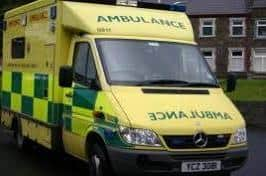Ambulance Service appeals to Northern Ireland public as temperatures rise
and live on Freeview channel 276
Although Northern Ireland is not likely to get close to the 40C being forecast for some parts of England and Wales this week, the NIAS is concerned that any sharp increase in temperatures will lead to increased demand for ambulances.
The NIAS has asked the public to be consider seeking the assistance of other healthcare services, such as pharmacists, in the first instance, and to consider “self transport” to the Emergency Department in a genuine emergency.
Advertisement
Hide AdAdvertisement
Hide Ad“When calling 999 you will be advised that your call has been accepted and to only call back if there is a change in patient’s condition. Please do not call just to check on ambulance arrival as this creates difficulties in answering other calls,” the NIAS said.


“If you find you are waiting for Control staff to speak to you, please be patient and do not hang up as you would lose your place in the queue. We will answer you as soon as someone is available.
“We want to re-emphasise that calls will be prioritised with less serious calls having to wait extended periods. We apologise for any delays you may experience but can assure you that we will get an ambulance to you as soon as we possibly can.
“But please help us help you.
“You can provide this help by following the following, simple advice which will help you through the heatwave, when it arrives:
• try to keep out of the sun between 11am and 3pm
Advertisement
Hide AdAdvertisement
Hide Ad• if you have to go out in the heat, walk in the shade, apply sunscreen and wear a hat
• avoid physical exertion
• wear light, loose fitting cotton clothes
• drink plenty of cold drinks
• if you have a health problem, keep medicines below 25C or in the refrigerator
• look out for others especially vulnerable groups such as the elderly, young children and babies and those with serious illnesses
• never leave anyone in a closed, parked vehicle, especially infants, young children or animals – even for a few minutes
Advertisement
Hide AdAdvertisement
Hide Ad• Remember that it can get uncomfortably hot indoors too. Try to keep your bedroom and living space cool, by closing the curtains on windows that receive the sun and opening your windows at cooler times of the day and overnight when safe to do so. Turn off non-essential lights and electrical items as these generate heat.
“Beware of swimming or diving into standing water eg quarry ponds or gravel pits as these can be unexpectedly cold causing shock, or can contain hidden obstacles under the surface which may trap swimmers.”